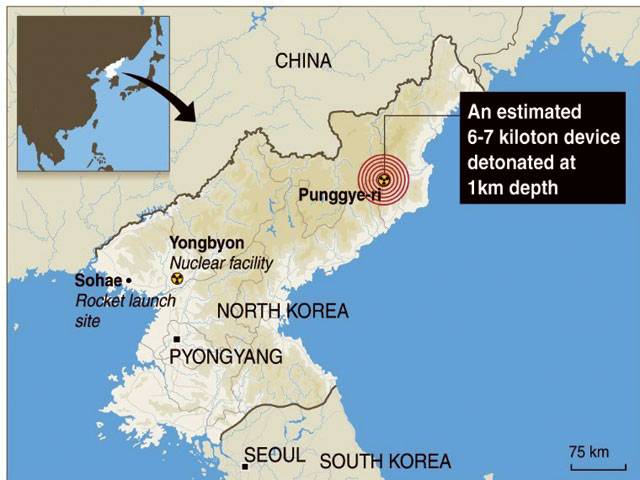SEOUL - North Korea on Tuesday staged its most powerful nuclear test yet, claiming a breakthrough with a “miniaturised” device in a striking act of defiance that was condemned by global powers.
The isolated state said its third underground test, after previous detonations in 2006 and 2009 that triggered a raft of UN sanctions, was a direct riposte to US “hostility”.
The claim that it involved a “miniaturised and lighter” device will be of particular concern, suggesting it is a step closer to fitting a nuclear warhead onto a ballistic missile following its successful launch of a long-range rocket in December.
Confirmation of the test from the North’s state media came nearly three hours after seismic monitors detected an unusual tremor at 0257 GMT in the area of the Punggye-ri nuclear test site in the northeast.
Analysts said the timing appeared to be an attention-grabbing calculation from a state well versed in provocative acts, coming just ahead of US President Barack Obama’s State of the Union address at the start of his second term.
It was the North’s first nuclear test since its new, youthful leader Kim Jong-Un took over from his father, Kim Jong-Il. Security analysts said it sent an unequivocal message of intent following December’s rocket launch. “The launch and the test are empirical evidence that Kim and his regime have no intention of negotiating away the North’s nuclear programme any time soon,” said Paul Carroll, programme director at the US-based Ploughshares Fund.
South Korea’s spy agency warned that Pyongyang might further up the ante by conducting another nuclear test or a ballistic missile launch in coming days or weeks.
On a technical level experts will be hungry to know if North Korea has switched from plutonium to a new and self-sustaining nuclear weaponisation programme using uranium. The KCNA statement did not specify what fissile material was used, but noted that the test’s success had provided the North with a “diversified” nuclear deterrent.
The North has substantial deposits of uranium ore and it is much easier to secretly enrich uranium, which can be done with centrifuges rather than the nuclear reactor required for plutonium enrichment.
Tuesday’s explosion had a yield of six to seven kilotons, said South Korean defence ministry spokesman Kim Min-Seok, significantly more than the 2006 and 2009 tests which both used plutonium.
The explosive yield compared with 15 kilotons in the world’s first atomic bomb dropped by the United States on Hiroshima in 1945.
North Korea’s first test yielded less than one kiloton and was widely seen as a dud. The second test yielded between two and six kilotons, according to Seoul.
The third test throws down a stark security and diplomatic challenge to Obama as well as to new Chinese leader Xi Jinping.
Meanwhile, North Korea said its nuclear test Tuesday was only a “first” step and warned of stronger action if it was faced with tougher sanctions as a result. “The latest nuclear test was only the first action, with which we exercised as much self-restraint as possible,” the foreign ministry said in a statement carried by the country’s official news agency.
“If the US further complicates the situation with continued hostility, we will be left with no choice but to take even stronger second or third rounds of action,” it said without elaborating.
The ministry statement said any measure like forced ship inspections or a sea blockade would be considered an “act or war” and trigger “merciless retaliations”.
“The US should make a choice between taking the path of easing tension... or continuing on its current, wrong path of pursuing anti-DPRK (North Korea) policies and further escalating tensions,” the ministry said.
Friday, April 19, 2024
North Korea defies world with nuclear test

US vetoes Palestine’s bid for full UN membership
8:27 AM | April 19, 2024
20pc Discos employees involved in power theft: Minister
April 19, 2024
Five govt officials shot dead in D I Khan
April 19, 2024
Parvez Elahi’s indictment delayed again in two cases
April 19, 2024
Hepatitis Challenge
April 18, 2024
IMF Predictions
April 18, 2024
Wheat War
April 18, 2024
Rail Revival
April 17, 2024
Addressing Climate Change
April 17, 2024
Justice denied
April 18, 2024
AI dilemmas unveiled
April 18, 2024
Tax tangle
April 18, 2024
Workforce inequality
April 17, 2024
New partnerships
April 17, 2024
ePaper - Nawaiwaqt
Advertisement
Nawaiwaqt Group | Copyright © 2024





